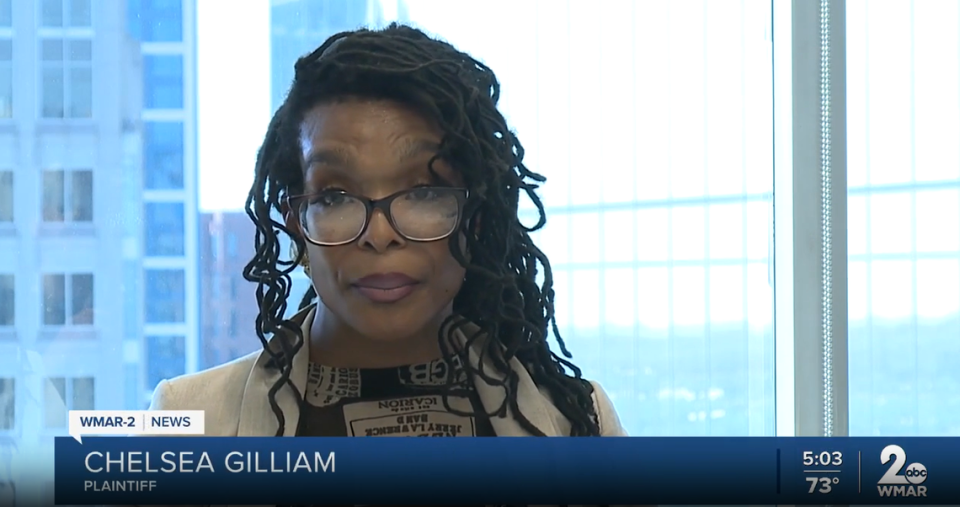Trans woman put in solitary jail cell after she was sexually assaulted, lawsuit says
A transgender woman was housed in jail with men for three months before she was moved to solitary confinement after a knife threat resulted in sexual assault, according to a federal lawsuit.
As a pretrial detainee in male housing in Baltimore, Chelsea Gilliam was denied hormone treatments she’d received weekly for 15 years and was harassed by inmates and guards, who are accused of refusing to refer to her as a woman, according to a complaint.
Gilliam was then transferred to a solitary cell — where she spent three more months and was only let out in shackles for an hour five days a week — because of her gender identity, the lawsuit filed on April 18 says.
The “mistreatment and torture” Gilliam faced violated the Maryland Department of Public Safety and Correctional Services’ policies on transgender inmates, as well as federal law, Gilliam’s attorney Eve Hill told McClatchy News in a statement.
Gilliam is suing the Maryland DPSCS, its staff and Corizon Health Inc., a company contracted to provide medical services to those in state custody.
She wants to “make sure this treatment does not happen to other transgender people,” Hill said.

DPSCS spokeswoman Latoya Gray told McClatchy News in a statement on April 20 that the department can’t comment on the lawsuit but takes “the protection of every single incarcerated person’s dignity and safety” seriously.
Gray said the state’s correctional facilities are evaluated by the Justice Department for abiding by the Prison Rape Elimination Act that prohibits placing lesbian, gay, bisexual, transgender or intersex individuals “in dedicated facilities, units, or wings solely on the basis of such identifications or status.”
“DPSCS is not aware of any facility that has ever received a corrective action for a transgender-related issue,” Gray added.
McClatchy News contacted Corizon Health on April 20 and didn’t receive a response.
Gilliam is housed with men and denied treatment, lawsuit says
Gilliam was diagnosed with gender dysphoria in 2003, when she began treatment for it at age 17 before legally changing her name to Chelsea in 2009, according to the complaint.
People who have gender dysphoria may feel serious “distress” over how their biological sex and gender identity don’t line up, according to the American Psychiatric Association.
The lawsuit stems from how Gilliam was sent to the Baltimore City Correctional Center after she was accused of assault and arrested on Dec. 17, 2021, according to the complaint.
She was housed with men until Feb. 2, 2022, despite her female gender identity, feminine appearance and medical history of hormone therapy, the complaint says.
In Maryland, housing of individuals with gender dysphoria in jail is to be decided on a “case-by-case basis” while “seriously considering the inmate’s opinion regarding (their) safety and (their) biological gender presentation and appearance,” according to a state executive directive issued in 2016.
Gilliam argues she wasn’t asked her opinion on what would be a safe housing placement for her.
When she complained, one jail staff member told her “you are a man and you are in jail,” the complaint says.
During her time in male housing, she was forced to shower with men, according to the complaint.
On one occasion while Gilliam was showering, a male inmate pulled out a knife, threatened her and sexually assaulted her, the complaint says.
She reported the assault to jail officials, but no action was taken, according to Gilliam.
Although Gilliam told jail staff she needed her hormone treatment when she arrived at jail, this wasn’t taken seriously until after she was sexually assaulted, according to the complaint.
The interruption of her hormone treatment caused physical and mental “consequences,” including the reemergence of facial hair, which caused skin irritation, an increase in testosterone levels and feelings of intense frustration, the complaint says.
DPSCS policy requires the jail’s medical services to continue an individual’s hormone therapy if it’s part of their “established regimen” for gender dysphoria, according to the state directive.

Gilliam is sent to solitary confinement
On Feb. 2, 2022, Gilliam was transferred to the Maryland Reception Diagnostic and Classification Center and put in administrative segregation, “a form of solitary confinement, solely because she is transgender,” the complaint says.
The complaint notes that the United Nations views isolation longer than 15 days to be “torture.”
Gilliam spent over three months in isolation, causing anxiety and depression, until her release in May 2022, according to the complaint.
The lawsuit argues Gilliam was subjected to “cruel and unusual punishment” in violation of the 14th Amendment to the U.S. Constitution.
“The defendants tried to erase me, what happened to me and all traces of me being transgender. But I will not be erased and I will not be silenced,” Gilliam said at a news conference recorded by WMAR 2.
Gray said DPSCS has “tirelessly worked on the complex issues related to the transgender incarcerated population, and is committed to updating its policies as necessary” in the statement to McClatchy News.
Man ‘eaten alive’ by bed bugs and insects dies in Georgia jail, family attorney says
Man dies after losing 45 pounds in jail over 20 days, lawsuit says. He ‘needed help’
Dad of 2 dies in jail from neglect after wife begs staff to check on him, lawsuit says
‘Gross medical neglect’ led to inmate’s death from organ failure, SC coroner says

